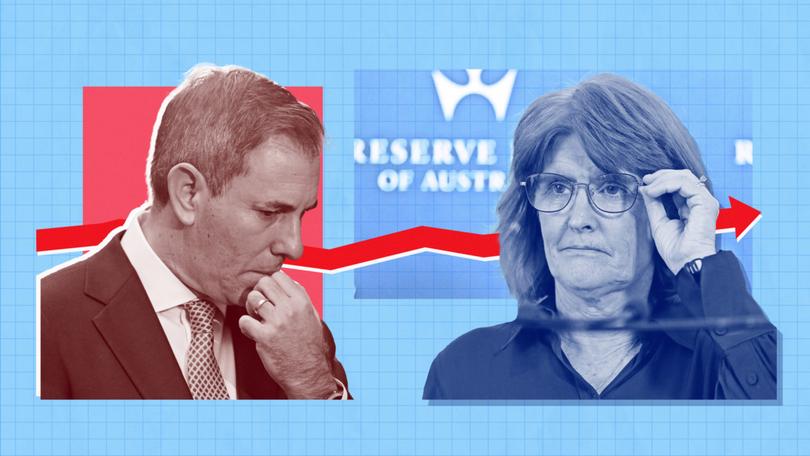Reserve Bank governor Michele Bullock says ‘sticky inflation’ would be met with rate rises
Governor Michele Bullock says ‘sticky inflation’ would be met with rate rises, saying the RBA has to think of the ‘economy as a whole’ when making the rates decision.

Australia’s economy is very weak but demand is still too high, Reserve Bank of Australia governor Michele Bullock says, and the bank “won’t hesitate” to raise interest rates again if necessary.
But Ms Bullock said Australia is still able to have a soft economic landing where recession is avoided, adding the continued strength of the labour market was supporting the broader economy.
“If it turns out, for example, that inflation starts to go up again, or it’s much stickier than we think (and) we’re not getting it down, then we won’t hesitate to move and raise interest rates again,” she told Senate Estimates on Wednesday.
Sign up to The Nightly's newsletters.
Get the first look at the digital newspaper, curated daily stories and breaking headlines delivered to your inbox.
By continuing you agree to our Terms and Privacy Policy.“In contrast, if it turns out that the economy is much weaker than expected, and that puts more downward pressure on inflation, then we’ll be looking to ease (rates).
“We can’t set interest rates with respect to one group of people. We have to think of the economy as a whole.”
The governor refused to buy in to economic speculation about whether the Federal Budget was inflationary or not, saying it could not be looked at in isolation when assessing the economy. She added the RBA tried to “look through” the impact of one-off features that would be reversed, such as the government’s electricity rebates, and those of States.
“I think it’s difficult to consider it in isolation,” she said. “It’s true that the Budget has more expenditure in it.
“My main concern is what it’s doing to inflation and what it’s doing to aggregate demand.”
Asked if the RBA would raise rates during an election campaign — the next Federal election is due mid-next year — Ms Bullock replied: “The board will do what they think they need to do on inflation.”
The RBA’s most recent rate rises began just weeks before the 2022 election in May, which Labor won and in which the Coalition was swept from office. Rates were 0.1 per cent and are now 4.35 per cent.
While the changes might affect headline, or overall, inflation, and people’s expectations, they were not expected to have an impact on underlying inflation, which is the RBA’s preferred measure because they exclude large movements in price.
Ms Bullock also said constant use of the term “per capita recession” — where output or growth per person is negative — was not helpful, nor was “technical recession” — where GDP or economic growth goes backward for two consecutive quarters.
“Recessions are about losses of jobs and human difficulties, and I don’t think that sort of concept of technical recession really captures that,” she said.
“The cost of higher inflation is something that we’ve got in mind. So if it did seem that the risks shift to the upside, then we’re very conscious that the costs of that are much higher.”
Ms Bullock was speaking just hours ahead of the release of the latest national accounts figures, which is expected to show flat or no growth in the economy over the first quarter of this year.
The governor also cautioned against looking at just a couple of years of productivity figures, saying the numbers “have been all over the place” due to shocks from the pandemic.
She said similar about monthly inflation figures, which were recently trending down — “and everyone was saying oh, inflation is falling much more quickly” — but were now trending higher — “everyone is saying ‘oh rates are going to have to up’”.
“I think we just need to step back a little bit and just watch what’s happening in a longer term,” Ms Bullock said.
The governor also repeatedly said the RBA was conscious of the impact of higher interest rates on many people.
“There is absolutely a portion of the population that are really hurting, they’re hurting from inflation, they’re hurting from higher interest rates, or they’re hurting from higher rents, we get that. We do,” she said.
“But on the whole, people are responding, and they’re responding by cutting back where they can.”
Assistant governor Christopher Kent told the hearing the RBA believes 80 per cent of the interest rate rises to date have flowed through to mortgages.
“Banks have actually been competing a bit more vigorously for good quality borrowers,” he said. “And so those who are able to either change banks or negotiate their banks have been getting better deals than they might otherwise have got.
“That’s why only about 80 per cent of the increase in the cash rates have passed through.”
